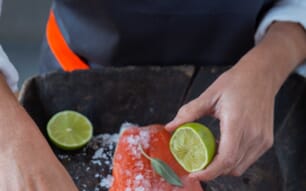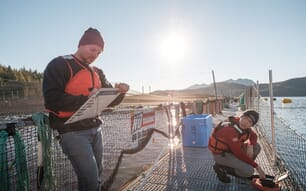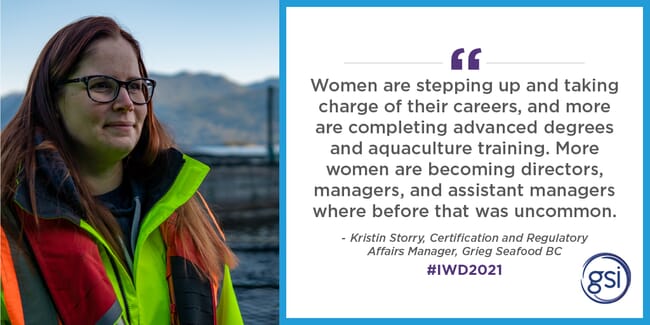
Covid-19 has put a stop to many things over the last year, but one thing still very much on is International Women’s Day (IWD).
IWD, a global event aimed at calling for gender equality, looks to celebrate the accomplishments of women around the world from political, economic, social and environmental perspectives. IWD notes: "A challenged world is an alert world. Individually, we're all responsible for our own thoughts and actions - all day, every day. We can all choose to challenge and call out gender bias and inequality. We can all choose to seek out and celebrate women's achievements. Collectively, we can all help create an inclusive world. From challenge comes change, so lets all choose to challenge.”
This year's IWD is especially important because we cannot let the pandemic slow down any progress being made in ensuring gender parity. In what the BBC has coined the “shecession”, women have been more affected by the pandemic than men – suffering from higher unemployment, rises in the gender pay gap, greater inequalities within the home, and increased chances of gender-based violence. We must take a moment and use this day to increase awareness and drive positive change.
At GSI, we believe that collaboration is the way to drive change. GSI members seek to be change-drivers, not only by contributing to nutritious and sustainable diets around the world, but also by building more equitable and inclusive workplaces. At GSI, we #choosetochallenge by highlighting the achievements and stories of women across our diverse member group, reflecting on the lessons learned and continuing to work collectively to drive further progress across the aquaculture sector.
Which is why this year, GSI is marking the day by inviting some of the inspiring women across our network to share their perspectives and experiences in driving change. Those interviewed ae Estefanía Humud, sustainability specialist at Blumar; Silje Ramsvatn, sustainability manager at Cermaq; ; Jemma McCowan, general manager of brands and sustainability with New Zealand King Salmon; and Therese Log Bergjord, CEO of Skretting.
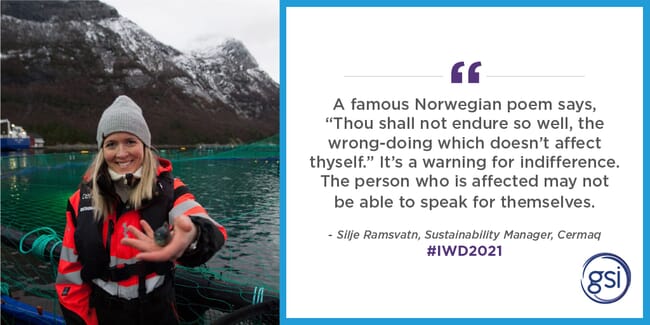
This year’s IWD theme is #ChoosetoChallenge, and we cannot deny that aquaculture, like most sectors today, is still male-dominated. What do you see as the biggest challenge facing women in the aquaculture industry?
Jemma: One of the biggest challenges is breaking down the perception that we are women operating in a man’s world. We’re women in OUR world and we have such a great contribution to make.
Silje: When it comes down to finding candidates for executive positions, the process still leaves room for gender bias. I am sure it’s not intentional, but there is a hidden bias, as many of the men on top will find “male qualities” more qualifying than more “female qualities”. This can be damaging to the group as a whole, as there will be a bias in the mindset and types of people represented.
Estefania: For many women, finding the right work-life balance is a challenge. It is important that we are able to conciliate them and maintain a good balance across the different dimensions of life, ultimately supporting good well-being, health and career potential.
Have you had challenging moments in your careers and how have you overcome these?
Jemma: I’ve spent years around meeting tables as the only woman, and often the youngest in the room. You’ve got to believe that you’re there for a reason and the strengths you bring to the table are valued. To keep that confidence up, it’s important to identify great supporters – whether peers, leaders or partners – who recognise and value your strengths, and act as your advocate – and not just female supporters.
Therese: I have accepted that I cannot have it all, so I do not try to be perfect. I do not mind showing my weaknesses, as we all have them. The trick is to surround ourselves with people we are inspired by and who know more than we do.
Estefania: The challenges that I have faced always have a common point in the best way to face them - communicate the challenges and solve them together through advice and new points of view.
When I started working with GSI, in 2013, there were no women at the board level and they now make up 20 percent of our boards, which is excellent progress. What do you see for the future of the sector in terms of expanding equality and diversity?
Therese: I think the industry will see major benefit from having a much larger participation of women. It cannot afford to not utilise fully this great source of skills. Teams can change completely when there is a good mix for the better.
Kristin: Women are stepping up and taking charge of their careers, and more are coming out of university with advanced degrees and aquaculture training. Already more women are becoming directors, managers and assistant managers, when that before was uncommon. I see this increasing in the future and more women will start taking more leadership roles in aquaculture.
Silje: I think we will have more women in the top positions and at sea. I also think we will see more women in technical positions. Having different types of people in all parts of a business and the value chain is important. Different backgrounds give a variety of perspectives and we will improve faster and make better decisions.
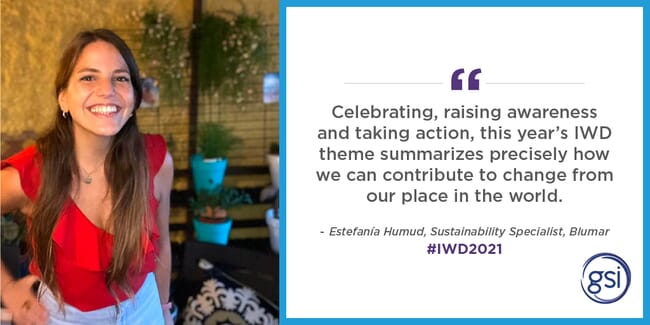
A key theme across the GSI members is a desire to continuously improve and to be at the forefront of responsible business action. Can you share an example of change happening within your roles or organisations?
Therese: Within Skretting, I’m very proud that we have set clear targets to improve diversity in our company. We know that diversity is much more than women/men, but this is our starting point that we will expand on. We will have 30 percent women in leading positions by 2025, and one third of new hires will be women. Some different initiatives include our “taking the stage” programme to empower women, and we also use mentoring and coaching as a tool for developing more female leaders. All of our operating companies have established local diversity and inclusion plans, so this is something that is working throughout our business.
Silje: In Cermaq, we are so many women of all ages and types of positions, and so many great women. I think we are about 50/50 men and women in administration and middle management, and we have a goal of increasing the number of women at sea by 50 percent. We also have discrimination and equality training for everyone, which I believe is a great demonstration of the industry-wide commitment to improving awareness and understanding.
Kristin: At Grieg we also participate in the SHE Index - an index developed by EY, which has been designed to reflect the true status of gender equality in corporate life, and we anticipate receiving a score of around 20 in 2021.
Estefania: For Blumar, gender equality is a challenge which we are actively tackling. It is part of the Blumar culture and is taken into account at the time of hiring, so that applicants are evaluated on their skills and not their gender. We can see this reflected in the high percentage of women in the plant and in the administration. In addition, in recent years women have been incorporated into positions that have historically been occupied by men in the farms.
Jemma: NZKS is working very hard on attracting a broad range of talent to our business to keep up the pace of innovation, creativity and leadership our company is renowned for in the salmon industry. As a larger company in our home region of the Top of the South Island of New Zealand, we’re also conscious that we have a part to play in inspiring other businesses to adopt practices that encourage diversity and equality, so we actively participate in community events and collaborations to support better social outcomes.
Why do you think aquaculture is a good industry for women to work in?
Jemma: There are so many opportunities for women to make a difference in aquaculture – both for their own careers and the unique outlook they bring to the industry. With the variety of skills needed in our industry and the fact that our industry encompasses farming, food, hospitality and retail, there are great career advancement opportunities. Women can bring creative skills, technical skills, relationship skills and specialist knowledge to all areas of aquaculture. It’s exciting to increase our diversity and challenge any physical barriers that have restricted female participation.
Kristin: This industry is always evolving, and it is great to be part of a job where advancements are regularly occurring, as it allows for room to grow and advance your career.
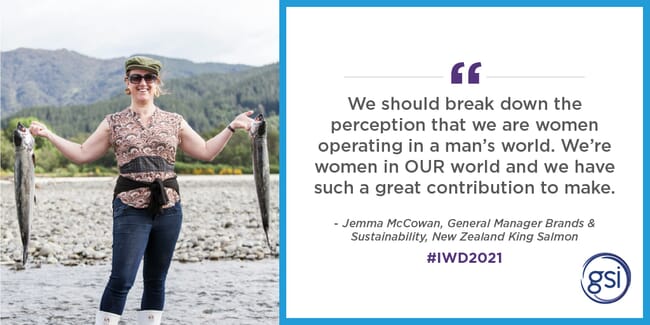
Estefania: It is a good industry for both men and women, since it is an industry that is focused on providing a high-quality protein in a sustainable and responsible way. This industry also has the opportunity to contribute to great current challenges such as sustainability, climate change, biodiversity, equity in every sense, stable jobs and good working conditions, responsible management of the oceans, and so many more.
Therese: It is a great industry. Aquaculture enables sustainable protein for a growing global population. It has a purpose, it is science-based, but with a great foundation with farmers across the world. People in aquaculture share a passion to make the industry better.
Silje: Being part of an industry producing sustainable and healthy food is motivating and fun. There are lots of different people, and always new challenges. I learn something new all the time. It’s a relatively young industry and we are evolving so fast, so why wouldn’t women want to work in aquaculture? It’s the industry for the future!
If you could offer one piece of advice to women thinking about entering the sector what would you say?
Kristin: An educated answer is the best answer. Many people can be tough on something they don’t know and especially something that is new. Aquaculture is a new industry and with that comes people who are not supportive. I always deal with any difficulty with science and evidence. I learned that there are times to listen and there are times to speak. Don’t be afraid to ask questions.
Jemma: Be brave, do what you love, ask for help, try new stuff.
Therese: Prepare yourself for having loads of meaningful experiences in a global arena.
Estefania: May they come with a desire to learn what aquaculture is – a sector which has huge purpose in providing food and nutrition to many people, and an area where they can contribute to supplying a sustainable protein to a growing population.
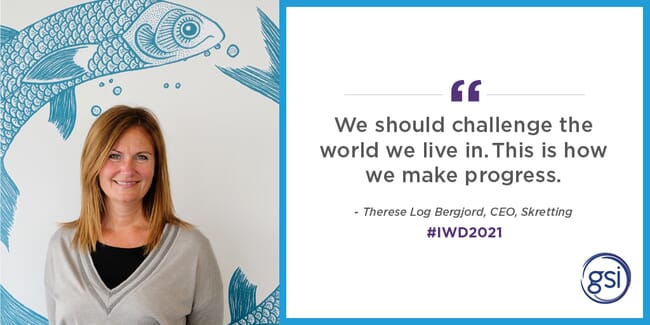
How does #choosetochallenge resonate with you?
Silje: It is very important to speak up if we see something. A famous Norwegian quote from a poem by Arnulf Øverland: “Thou shall not endure so well, the wrong-doing which doesn’t affect thyself”. It’s a warning for indifference, and I think this applies to many situations. The person who is affected may not be able to speak for themselves.
Jemma: It’s only in recent years that I’ve learned to associate challenge with positive outcomes, rather than challenge as an undesirable female trait. I’ve definitely learnt that choosing to challenge – in the right circumstances and in the right, respectful way – is worth doing when you really believe in something.
Estefania: I love how it gives a different emphasis to this day, not only a day of commemoration, but it invites us to think about how we contribute to a more just world. Celebrating, raising awareness and taking action.
Therese: I’m very positive to the idea that we should challenge the world we live in. This is how we make progress.
As we look to drive change across our work and communities, what would you say the pandemic has taught you?
Jemma: The pandemic has really shown how leaders respond in a crisis and how teams can pull together at amazing pace. Opening the doors to imperfections, admitting vulnerabilities, and communicating “work in progress” has already started to change leadership styles for the better, especially in aquaculture where transparency is in demand.
Estefania: The pandemic has sharply challenged the way in which our society develops. It has forced us to reflect on the role of companies and we have seen ourselves as workers in a much more personal and humane way, since we all share the same concerns.
Kristin: This has been the time where new ideas have flourished.
At GSI, we believe recognizing each other’s differences and strengths, and mobilising these, will help drive the change society needs. By choosing to challenge we are each accepting our responsibility to be change drivers.
Visit GSI’s Twitter, Instagram and LinkedIn to keep this conversation going.

